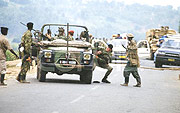The recent publication by the Rwandan government of its findings to do with France’s complicity in the 1994 genocide, detailed in the Mucyo Commission report has raised the ire of persons in certain quarters who claim to have a monopoly over moral ‘truth’, in the interpretation of Rwanda’s history in particular the Tutsi genocide.


The recent publication by the Rwandan government of its findings to do with France’s complicity in the 1994 genocide, detailed in the Mucyo Commission report has raised the ire of persons in certain quarters who claim to have a monopoly over moral ‘truth’, in the interpretation of Rwanda’s history in particular the Tutsi genocide.
Among these are French government apologists, masked as analysts and philosophers, Barrie Collins and Professor Peter Erlinder who have a disturbing negative propensity of wanting to re write Rwanda’s history through exposing ‘truth’, about the genocide.
A ‘truth’ whose satisfaction is based on the very narrow pathetic analysis that seeks to rationalize mass murder in seeking moral justifications for a wrong committed against a whole generation of people.
Dangerous thinking in the sense that this is not the first genocide against the Tutsi, remember 1950’s?
These genocide apologists under the cover of political analysis are dubiously promoting and justifying the genocide ideology, to a point where one is afraid of a future repeat, under their gleeful watch.
Unpacking some of their writing exposes a dangerous underlying feeling that the genocide was a result of inevitable political and moral justifications.
"The start of the bloodiest stage of the war is far more complicated than the moral storytellers – who blame it on the then evil government’s determination to secure Hutu domination – would have us believe,” pontificates Collins.
He goes further to claim that the start of the genocide was, "an act of international terrorism that triggered the return to war. In early April 1994, an aeroplane carrying Hutu President Juvénal Habyarimana was blown out of the sky by a missile attack that had been planned for several months.”
Even more repulsive is Prof. Peter Erlinder, another genocide apologist in his reference to the Mucyo report as, "Kagame’s Big Lie.”
He argues that, "most press coverage of the "French Report” failed to note that Kagame, and much of the Rwandan leadership, is already under indictment for War Crimes and Genocide in both France and Spain, and that the "French Report” is a response to existing indictments of Rwanda’s leaders.”
Both men exhibit signs of selective amnesia as they seek to re-write Rwanda’s history in a manner that equates the victims and perpetrators of the genocide. In seeking to make heroes out of the mass murderers many of whom are on trial today.
In their callous narrative of the genocide history they find a moral basis for prosecuting those lauded with ending the near extermination of a whole Tutsi population; in this case the Rwanda Patriotic Front, while finding excuses for the insidious role France played.
"But the truth is that France’s major mistake was to find itself on the wrong side of the moral parable that has been imposed by Western observers on Rwanda’s recent tragic history,” writes Collins.
Well documented in the Mucyo report is France’s political, military, diplomatic, logistical support and even direct assistance to the genocidal regime is brought out; in the report compiled after extensive interviews and the use of raw data compiled over a period of two years.
Erlinder and company’s seemingly unrelenting resolve in downplaying and undermining Rwanda’s achievements is not only questionable but also unacceptable.
Even more unacceptable is the attempt to question the Rwandan governments legitimacy, dismissing it as an imposition of some western powers, in particular the USA.
Both men fail to acknowledge the democratic processes that have taken in place in Rwanda since the genocide, stuck in a time warp that fails to acknowledge the restoration of multi-party democracy in the country.
In September Rwanda holds yet another election. Invited are election from major international institutions, governments, civic groups, many who have already arrived.
Democratic processes that are totally disregarded as the pro French spinners try to justify a double genocide of sorts, disregarding credible statistics of the actual death toll.
Evidence which Erlinder has unsuccessfully tried to push through the Canadian government, the International Criminal Tribunal for Rwanda (ICTR), the United Nations, instead they now want to convince the world that all those who have refused to accept these dubious allegations against Rwanda are all manipulated puppets of the Americans.
"This creates a new chapter and ends an old one. The question is, where do the two sides go now? The French tried in every way to unseat Kagame, but now recognize he is here to stay. But you aren’t going to get an apology from the French.... The Hutus were armed and trained by a foreign power that walked away and said ‘I never did it’,” comments the author of ‘Silent Accomplice’, Andrew Wallis.
For those wishing to re write Rwanda’s history, surely they should know that it is being written at this very moment, and will not wait for those stubbornly stuck in a primitive past that refuses to accord Rwanda and her leaders their rightful place on the international stage.
Ends


